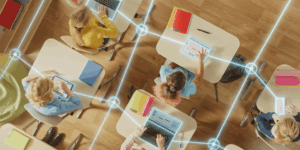The modern technology environment has made screen time so widespread that it exists everywhere all the time. The digital usage of children and teenagers has reached historic highs because they use smartphones, tablets, gaming consoles and laptops for extended periods each day.
Technology provides both virtual connections and educational benefits and entertainment options, yet it damages youth social abilities which cannot be ignored.The Digital Citizen Academy founder and clinical psychologist has dedicated multiple years to research how digital screen activities affect young people. Excessive screen time has become a widespread issue which steals away from face-to-face interactions thus causing a decline in essential social skills needed by children for future success.
The Cost of Constant Connectivity
Children who focus on their screens receive reduced chances to learn about facial expression reading and tone understanding as well as empathy development and conflict resolution abilities. The development of these abilities requires genuine interactions which happen more than once. Children who lack these essential skills will find it difficult to create friendships and manage their emotions and maintain confident communication.
Research studies indicate that children who spend extended periods with screens become more likely to face difficulties with:
- Difficulty initiating and maintaining conversations
- Active listening and attention difficulties during interactions with people face challenges.
- The experience of anxiety in social situations becomes more frequent.
- Lower levels of emotional intelligence
- Poor conflict resolution and collaboration skills
The widespread observation by parents and teachers reveals students who text each other while sitting apart and who avoid eye contact and feel anxious during face-to-face discussions or group activities.
Why It Matters
Students who develop social abilities will achieve success in their friendships and academic studies and professional environments. A person’s ability to work with others and show leadership and problem-solving skills together with emotional toughness depends on social abilities. When we substitute human contact with technology, we create the possibility of raising a generation which has technical connectivity but lacks emotional intimacy.
While various social media platforms claim to connect users, they actually create shallow interactions between users rather than meaningful friendships. The digital expressions of approval through likes and emojis fail to provide the emotional richness of genuine conversation while posts on social media do not display genuine vulnerability.
Social Skills Development Strategies for Digital Times
Digital Citizen Academy promotes equilibrium through screen restrictions which enable healthy child development by establishing proper limits for device usage. A few key strategies exist to support parents and educators in helping students develop social skills:
Prioritize Face-to-Face Time
Family dinners together with face-to-face playdates and real-life group activities should be scheduled regularly for children. Encourage group projects, drama clubs, or sports teams that promote communication and collaboration.
Teach Digital Etiquette and Communication
Students need to understand that online communication differs from offline communication. Teach students about how tone works and how texts can be misunderstood along with the need to read nonverbal signals.
Set Screen-Free Zones and Times
All classrooms and dining areas along with bedrooms need to remain free of screens as much as possible. Brain function needs time to relax through tech breaks which enables people to connect with each other more deeply.
Model Healthy Tech Use
Kids mimic adults. When children witness your complete focus during conversations without phone interruptions, they will develop this habit themselves.
Practice Empathy and Emotional Literacy
The discussion should focus on emotions and conflict resolution methods and how to offer support to others. Through conversations about different perspectives students learn to see things from other viewpoints which proves vital in both online and offline situations.
Final Thoughts
The elimination of technology from our world is impossible and we should preserve its existence. The digital world will remain present, but children need to develop skills which will help them move between online and offline realities effectively and with emotional understanding. Social abilities are not something that people can choose to have or not since they form the basis of human relationships and communities. Screen time needs proper regulation to prevent it from replacing essential human interactions which bring true depth to our existence.




